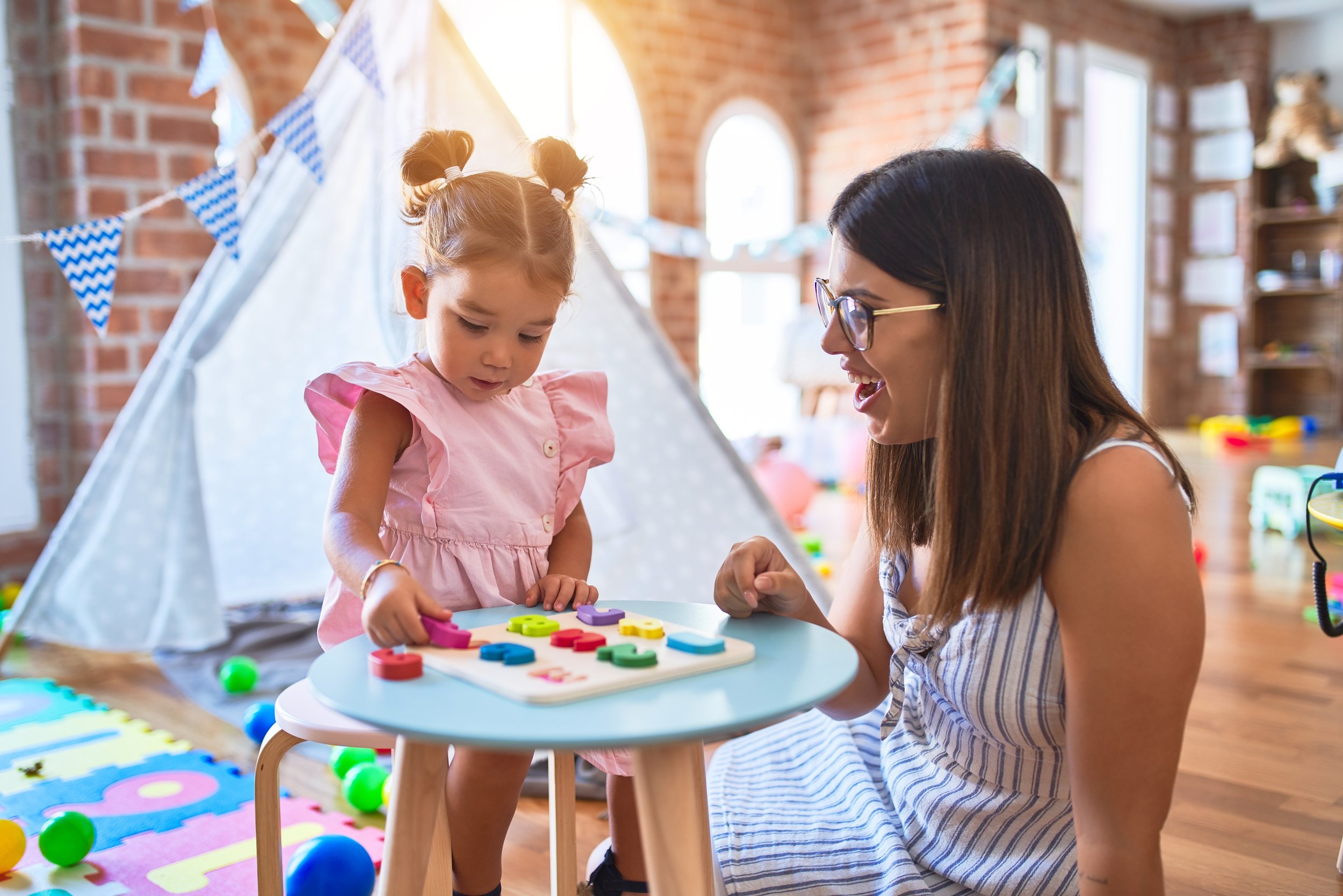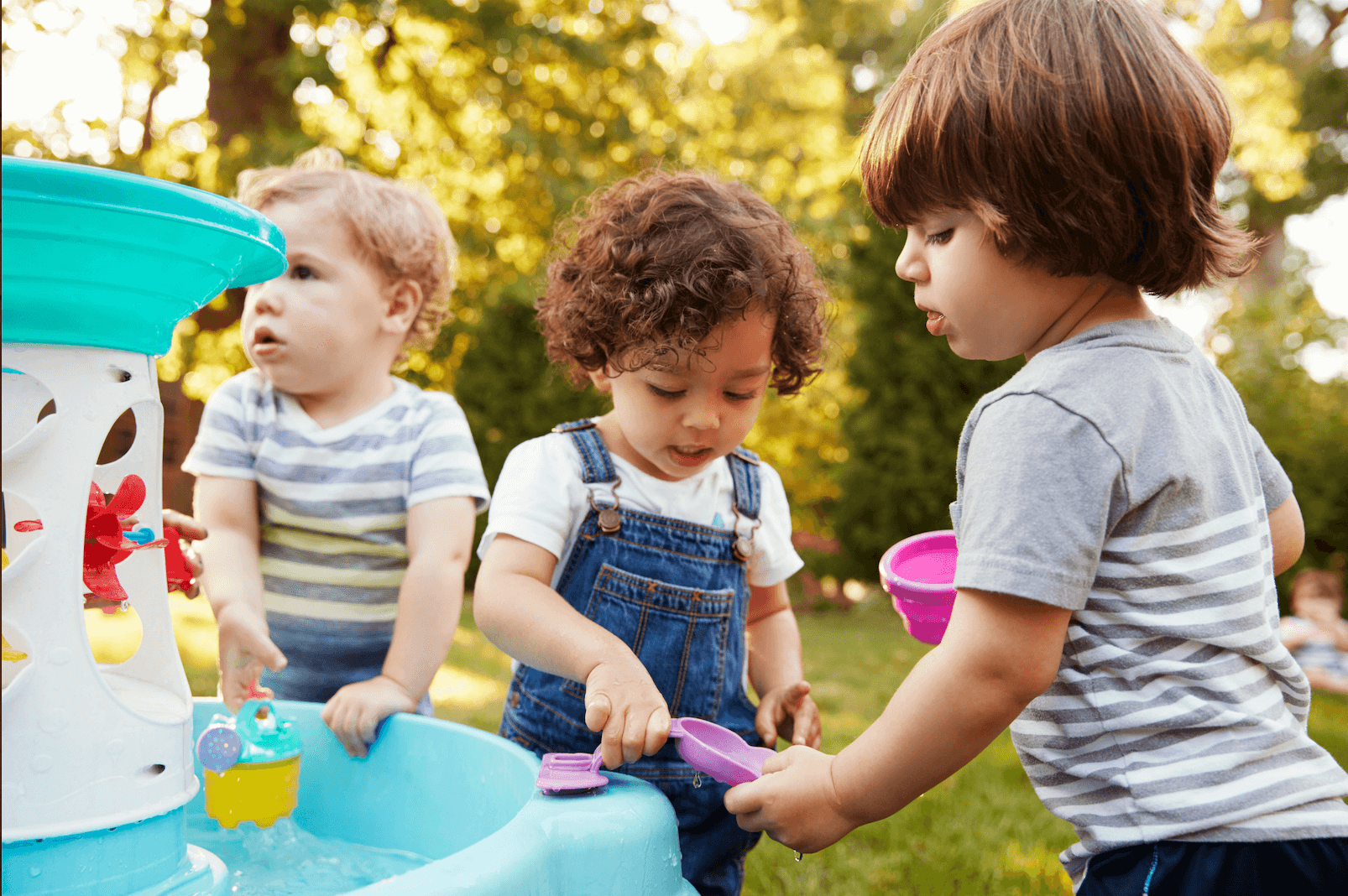My 18 Month Old Isn’t Talking, should I be worried?
As a pediatric speech therapist, one of the most common questions I hear in speech and language evaluations for toddlers is: “My 18 month old is not talking, just babbling. Should I be worried?”
Asking the question alone is a great first step towards helping your little one say their first word and grow their talking skills.
To help you figure out the next best step for your and your little, there are lots of other information I’ll share too, like:
Or if you prefer to watch and listen, I’ve included a video that teaches you about what’s happening when 18 month olds aren’t talking yet.
How do toddler’s learn to talk
Toddlers learn to talk in incremental building blocks. The communication skills your child is learning are building upon the ones they have already mastered.
In speech therapy for toddlers, we always want to know how your child is communicating today so we can build up their communication skills step by step, and fill in any gaps for them too.
Here are the building blocks for toddler’s learning to talk:
Cooing - Coos are the first speech sounds that babies make. Babies are learning how to turn on their voice when they learn to make cooing sounds. They are figuring out how to coordinate their breath so that their vocal cords vibrate together as they breathe out so they can make sounds. Fun fact: if you put your hand over your voice box when you talk you can actually feel this vibration!
Babbling - Babbling is another important stepping stone towards talking! Babbling is great practice for making different sounds that children will later put together to say words. If your 18 months old is babbling but not talking, they are getting great practice making sounds and it’s all about teaching them how to combine their sounds in different ways to say words. This happens naturally over time and some toddlers need a little extra help to figure out how to pronounce words.
Gestures - Before children can say words, they show us what they are talking about. Babies and toddlers use gestures, like pointing, waving, and baby sign language, to let us know what they want and need. Gestures are an important part of learning to talk because children are learning the cause and effect of communication. When they point to something specific, they get it. When they use the baby sign “more,” they get more tickles, bubbles, or more of a yummy snack!
Jargon - Somewhere along the road to talking, your baby will start speaking in their own language or talking gibberish. Jargon is important because it gives your baby a chance to practice with different sound combinations, a skill essential for saying their first word and lots of different words!
Sounds as Words - Before your little one says their first “adult” word, they may use sounds to tell you about something specific. And for little kids, these do count as words. For example, they may say “moo” to tell you about a cow, or “Oh-no!” to tell you they dropped their spoon on the floor. When your baby uses as a sounds as a word you know they understand the relationship between a word (or sound) and it’s meaning, it’s very cool and exciting!
Words - Then, your little one says their first word. After they have put in TONS of practice making sounds and learning the meaning of words, they figure out how to move their mouth just right in order to say their very first word! Then they keep learning words. After your child says their first word, you will likely notice growth spurts in their vocabulary.
Related: Baby first words list
What counts as talking?
If we think about the building blocks of talking we just learned, talking could be used to describe the last two steps: Sounds as Words and Words. If you look up the definition of talking, it is defined as the action of speaking or saying words.
You can count something your little one says as a word when:
They say it only to refer to one specific thing (they say “Dadu” only to refer to their dad)
They say it the same way every time (they say “Dadu” to ask for help, call for his attention, or scream his name in excitement when he gets home from work)
They have said it at least 3 times!
Before we talk about the reasons why an 18 month old might not be talking, I want to answer a few more common questions about what counts as a word.
Do baby signs count as words?
Yes and no.
Baby signs count as an idea your child can express, it’s a part of their expressive vocabulary. They can express a specific meaning clearly and effectively through their baby sign.
However, if your child is successfully using baby sign language it doesn’t mean that you shouldn’t seek help for your child. If your child knows 20 baby signs but they are saying 0 words, that tells us something. While your child clearly understands language, something is making it hard for them to say words. Supporting them in mastering pronunciation skills is important!
So yes, baby signs count as words but they don’t count as words your child can say.
Related: How to successfully introduce baby sign language
Do animal sounds count as words?
Yes, animal sounds count as words when children use them to tell you about a specific animal. For example, if a dog walks past your house and your child points out the window and says “Woof-woof!” to tell you they see a dog, then “Woof-woof!” is a word.
While we are on the subject of sounds, exclamatory remarks, like “Oh-no!” and “Oops!” count as words as well when your little one is using them to express a specific meaning. For example, if they say “Oh-no!” to tell you I just threw my pasta on the floor!
Why isn’t my 18 month old talking?
To be honest, it’s really hard to find a specific reason why 18 month olds aren’t talking (unless your child has qualified for a developmental diagnosis of autism, cerebral palsy, down syndrome etc. which we know are associated with delays in speech and language development). The reason it’s hard to know is that at 18 months a child’s communication system is still developing significantly and they are saying less words, so it is very challenging to see patterns and indicators of what might be causing them not to talk until they are a little bit older.
That’s one of the benefits of starting in speech therapy early. If there is something specific causing your child to have a hard time talking, the speech therapist will be spending more time with you and your child and they can watch for signs of either speech or language difficulties.
There are some common classifications speech therapists will use to explain why 18 month olds aren’t talking yet.
Speech Delay - When speech therapists talk about a speech delay, they are referring specifically to a delay in a child’s ability to actually make sounds. You can think of a speech delay as a delay in pronunciation. Children with a speech delay may later be diagnosed with an articulation disorder or childhood apraxia of speech.
Language Delay - Language delay is a term used to describe children whose ability to express themselves, vocabulary size, and/or understanding skills are behind what most other kids their same age are doing.
Late Talker - The term late talker is used to describe a child who is developing age expected skills in every area of development except talking. Their understanding, play, social, cognitive, and physical skills are on track, but they are late to start talking.
Expressive Language Disorder - This is a technical term used by speech therapists in medical documents to describe a child whose expression (gestures and talking skills) are behind what is expected for their age. A child who visits a speech therapist at 18 months and is not talking will probably receive a diagnosis of an expressive language disorder and insurance will pay for them to attend speech therapy.
Mixed Receptive and Expressive Language Disorder - Receptive language disorder is another technical term used by speech therapists when writing medical documents for insurance. The term receptive language disorder is used when a child’s understanding skills are behind what is expected for their age.
Children do not have receptive language disorders without also having an expressive language disorder, because understanding comes before expression. You cannot use words to ask for things or make comments unless you know what they mean.
The term mixed receptive and expressive language disorder is used to describe delayed receptive and expressive language skills.
So if a child is 18 months old and not talking, plus they are struggling with understanding, they will likely receive a diagnosis of a mixed receptive and expressive language disorder at their speech and language evaluation.
Related: They said my child has a language disorder
It’s always a good idea to check your toddler’s hearing!
Your child’s hearing abilities are directly related to their learning spoken language.
Toddlers are more prone to ear infections and ear wax obstruction because of the shape of their ears. Both ear infections and wax can limit your child’s ability to hear. If they have a harder time hearing sounds, they will have a harder time learning to say sounds.
It is also possible for toddlers to have a hearing loss in one or both ears. For these children, getting fitted for hearing aids can significantly improve their language learning.
Related: Why does my toddler need a hearing test with audiologist Dr. Michele Hu
How to encourage talking for 18 month olds
The two best things you can do to encourage your 18 month old to talk is to set aside a few minutes a day for intentional practice and to find the support of a speech therapist to learn tried and tested techniques.
Practicing at home
A little bit each day - You don’t need to rearrange your whole day for speech practice! Rather think about the activities you already do and practice during an activity your child really likes. For example, repeating the word “eat” as many times as you can at snack.
One skill at a time - It’s soo tempting to try to teach your child everything at once; but your practice will be more fruitful if you can focus on one thing at a time. The more specific you can be the better! For example, working on having your child look at you when you say “more” before you blow bubbles because you want them to learn to say more to ask for something.
* Use our building blocks for talking hierarchy and start your practice with the highest building block your child can already do! Build their confidence by practicing with something they can do and then grow from there.
Cooing —> Babbling —> Jargon —> Gestures —> Sounds as Words —> Words
Make it fun - Lastly, don’t forget to have some fun! We are all more engaged when we are having fun; and it’s easier to learn new things when you’re engaged. So by making your at home speech and language practice fun, you are helping your little one learn!
Learn even more with our free Toddler Talk Lessons - Start Now!
Find a speech therapist near you
Speech therapists are trained professionals who can help support a toddler's emerging talking skills. They will help you come up with a plan for growing your child’s skills one step at a time. Plus, they will guide you through your at home practice.
And keep in mind, speech therapy is a marathon and not a sprint. It takes patience and time to help your child master new skills; and it’s so fun to celebrate the little wins along the way!
Does my 18 month old need speech therapy?
Lots of parents want to know if I think their 18 month old is going to catch up on their own.
We’ve all heard stories about late talkers who didn’t say their first word until 20 months and then had a language explosion. Research shows that about 70-80% of late talkers will catch up on their own. That means 20-30% of late talkers will not catch up on their own [1].
So when parents of 18 month olds who haven’t started talking but are on track in all other areas of development ask if their toddler will catch up on their own, I say, “It’s possible, but not guaranteed.”
Why you don’t want to “Wait and See”
There’s no way to know if your child will catch up on their own or not. And because it’s not guaranteed, I don’t ever recommend you wait and see if you are concerned about your child’s language development.
If you are looking for some reasons why starting speech therapy now is a great idea, I’ve listed my top 5 reasons here:
Starting when the gap is smaller is easier than waiting to start when the size of the gap is larger
Starting sooner will likely mean less time in speech therapy because there’s less catch up to do
Children under the age of 3 years old are undergoing a period of rapid brain development which makes them very receptive to learning
There’s really no risk in having a speech and language evaluation - the appointment is designed to be a fun and natural environment for your child
Having the support of a speech therapist can help take all the pressure off you
Mom Guilt (Dad Guilt)
“I feel like it’s my fault that my baby isn’t talking yet!”
Mom (or dad) guilt is felt by every parent; you can’t help but feel like it’s your fault.
So before you go, I want to assure you that “You’re not a bad parent! You are an amazing mom (or dad)!”
If an 18 month old isn’t talking, it doesn’t mean that you are a bad parent or that it’s your fault. It also doesn’t mean that your child can’t catch up in their language development. BUT it does mean that your little one could benefit from speech therapy strategies to help them start talking so they can tell you everything they want to say!
Related: How to find a speech therapist near me
Here Are Some Related Questions Parents Also Asked:
Is babbling at 18 months normal?
Babbling and talking are both expected at 18 months old.
Babies begin babbling as a way to develop their mouth and prepare for talking. Their babbling will change over time from repeated syllables “ba-ba-ba” to sound more like gibberish, or as if they’re speaking in their own language. Babies and toddlers will continue to babble until they are fully talking.
What to do if my 2 year old is babbling but not talking.
Is toddler babbling normal?
Yes, toddlers are expected to babble. Babbling is an important stepping stone towards talking; it allows toddlers to develop coordination of their speech system so they can begin to pronounce many different words.
At what age should you worry about a child not talking?
As a general rule of thumb, if your child hasn’t said their first word by 14 months old it is a good idea to schedule a check-in with the pediatrician. If your child hasn’t said their first word by 14 months old, their pediatrician may recommend a speech and language evaluation which is designed to identify what might be making it hard for them to learn to talk and how you can support them best.
You may also enjoy reading: How many words should an 18 month old say?
Written By: Stephanie Keffer, MS CCC-SLP
Recently on the blog:
References:
Hawa, V. V. & Spanoudis, G. (2014). Toddlers with delayed expressive language: An overview of the characteristics, risk factors and language outcomes. Researchers in Developmental Disabilities, 35, 400-407.
© 2020-2025. Stephanie Keffer Hatleli, MS CCC-SLP. All Rights Reserved.
The content offered on ToddlerTalk.com is for informational purposes only. Toddler Talk is not engaged in rendering professional advice, whether medical or otherwise, to individual users or their children or families. No content on this site, regardless of date, should ever be used as a substitute for direct medical advice from your doctor, speech language pathologist, or other health professional. By accessing the content on ToddlerTalk.com, you acknowledge and agree that you are accepting the responsibility for your child’s health and well-being. In return for providing you with information related to home speech and language practice, you waive any claims that you or your child may have as a result of utilizing the content on ToddlerTalk.com.













Explore language tips for potty training tailored to your child's communication stage. From toddlers who are just beginning to talk to children speaking in sentences, learn how to use gestures, sign language, storytelling, and consistency to support your potty training journey.